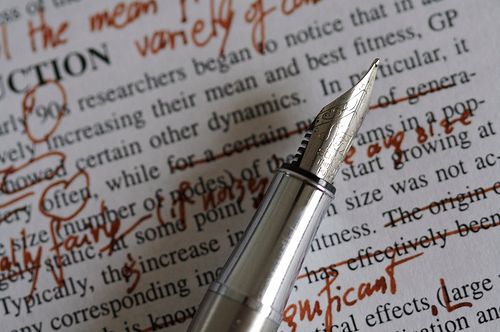This is a Building Blocs post from Allison K Williams, an experienced professional editor.
Professional editing offers some choice lines of copy. In a recent manuscript I found this pearler.
“He left the theatre, contemplating his own intensity.”

Image source: Flickr CC / nics_events
Last year, I edited a sample chapter from a dystopian chick-lit manuscript. The author thought my advice was spot on and my open time slot fit her deadline. I quoted her 2.5 cents per word for a developmental edit of her 127,000-word book. About US$3000.
She declined to purchase my services.
You may be thinking “Damn straight! That’s incredibly expensive!” Or “I paid twice that, did I get ripped off?” Or maybe “I got edited but it didn’t help.” Or perhaps you paid an amount you were happy with and had an editor dramatically improve your manuscript and your craft. But professional editing is expensive.
Why is professional editing so damn expensive?
1) Professional editing is what it says on the tin. It's highly skilled labour. Many editors have graduate degrees and have worked on books published by major houses before freelancing. A good editor is a strong analytical thinker. They can say why your storyline isn’t working and ask the right questions for you to realize how to fix it. They have top-notch grammar and spelling skills—and they can tell when a character isn’t supposed to have good grammar, but something in their speech is inconsistent. A good editor can identify when a problem is structural and when it requires just a minor rewrite.
2) It’s very time-consuming. I work pretty fast, about 1500 words per hour for a developmental edit (big-picture problems with plot, characters, craft issues and how to fix them), faster for a manuscript appraisal (is this ready for publication? Why or why not?). That’s around 50 hours for an 80,000-word manuscript. If I note and explain every error—useful for writers improving their craft, or non-native speakers publishing in English—I’m much slower. Either way, a 15-20 page single-spaced editorial letter summarizing the notes, asking questions, and with mini-lessons on craft takes another 3-5 hours. This takes full brainpower—I can’t have the TV on and I can only do 5-6 hours before my focus is shot and my eyes are done, though I did get some ri-dork-ulous magnifying, anti-glare gamer glasses recently.
3) A good edit is the equivalent of a personal MFA class (and costs about the same). But with professional editing, someone reads your entire manuscript (most university writing courses don’t workshop whole books), and you don’t have to read or give feedback on anyone else’s work. An edit takes 3-8 weeks, rather than an entire semester.
“The day to day living conditions of the majority of people who lived at the time and place of the Han Dynasty are really nebulous.”
When do you need professional editing?
When you’ve done as much as you can on your own, but the book still isn’t ‘done,’ or you’re sick of getting rejections and you don’t know why, then you might find professional editing useful.
A great compromise is to get a fellow writer you trust to give feedback. This should be someone who doesn’t love everything you write—praise is not useful at this time. Later, you read their work, or buy them a very nice present. It helps to ask for specific feedback, like “Does the main character’s emotional journey make sense?” or “Can you please highlight everything you think I can cut?”
It’s a waste of money to hire an editor too early. Be on at least your second or third draft and get—and use—feedback from other writers before spending cash on a pro edit.
“An unlimited urgency of desire came over him.”
How can you make sure you’re getting your money’s worth?
When hiring a professional, you get what you pay for—and what you check out thoroughly. Make sure your editor is the real deal. Some editors hold certificates from formal training, others have extensive professional experience. It’s OK to ask to contact a previous client. It’s OK to ask for a sample edit, though how much an editor does and whether they do it for free varies. And it’s worth getting two or three sample edits to see who’s a good fit for your work. Don’t get more than a few samples, though—it’s confusing for you, and it’s mean to waste the time of people you have no intention of hiring.
Some editors charge by the word, others by the hour or project. The Editorial Freelancers Association has a rate chart for North American editors, with suggested hourly rates for each type of edit, but prices cover a huge range—experience, qualifications, and geography all affect the price. Outside of North America, you can try contacting your local editors’ society for more information about pay rates.
Here’s how I price my professional editing: I read a chapter to determine what kind of edit to offer, because the author is frequently wrong. They request “proofreading” when what their book needs is a top-to-bottom rewrite after a developmental edit, or “copyediting” when the dialogue is a mess. It’s hard to hear your manuscript isn’t ready, but it’s stealing from the writer if I don’t tell them they’re asking to buy red when they need blue.
Then I do a short sample edit or give developmental-type feedback. I’m a heavy commenter, so 3 pages is usually plenty for the writer to judge my work. I give the author my recommendations and a written estimate, when I can start (I’m booked a couple months in advance) and the time it will take (usually 2-6 weeks). If they accept my offer, we sign a contract and they give a deposit to hold their time slot. The author makes another partial payment before I return the manuscript, and a final payment the week after they get it back.
”Do you want these weapons?” Asked John.
What can you do to prepare, and how can you bring down the price?
There are some basic technical fixes you can apply to your manuscript that will improve your writing remarkably in a short time.
- Search for “ly.” For every single adverb in your manuscript, ask if you really need it. If the adverb’s in a dialogue tag (that’s the “he said” part), rewrite the dialogue to make the tone or emotion clear, or use an action.
“You’re hurting my arm!” he said angrily. (Adverb states the obvious)
“You’re hurting me!” He wrenched his arm away. (Use an action)
“You’re hurting me!” (Trust that the dialogue’s tone is clear)
- Search for “being” “doing” “going” “began” “continued” and “started.” Most sentences will be stronger if you just use the verb.
“He began to get angry” vs. “He got angry”
“She was doing her knitting” vs. “She was knitting”
- Read through the manuscript focusing on only one character. Are their actions consistent? Does their dialogue sound uniquely like them and not like another character? If you removed the dialogue tags, would you know who was speaking? Repeat for every character.
- Is your manuscript within the usual word count for the genre? If not, look for cuts. Ask of every scene, “Does the main character’s journey move forward? What important discovery or action happens here?” Cut the least useful scenes. Use the old screenwriter maxim, “Get in late and get out early”—does every scene start as late in the action as possible? Does every scene end as soon as it can? I trimmed a client’s book from 130,000 words to 95,000 words without cutting any of the actual story by editing out characters getting out of their cars and walking down hallways. Start scenes when the action starts.
“I knew I shouldn’t have stood back and watched as my mother was kicked to death by that moose.”
Here’s what it’s like for the editor:
I market myself with negative language—I’m the Unkind Editor—because I have heard so many authors say “I just want someone to tell it to me straight.” Writers know what they’re signing up for. But still, every time I send off a finished edit, I’m terrified this will be the writer who’s offended and hurt and doesn’t want to pay me. Someone who thinks I’m full of it, or I did a terrible job.
So far no one has freaked out. And I’ve gained courage with each one, to say frankly where the problems are, as helpfully as I can. Yesterday I took a big leap: I told an author, “This is good – it’s much better than the previous draft. But it could be great. I can copyedit like you asked, or you can read these 26 pages of notes and write another draft.” I bill by the word, so it doesn’t help me any to put in the extra reading hours. But when a book is almost there, when I can see greatness hovering in the distance, waiting for the right word or plot point or image to usher something marvelous into the text - that excites me beyond belief. When an author allows me to be their partner, when they are willing to deal with the vulnerability and natural resentment of someone else dissecting their beautiful child, when they are willing to examine and improve their craft—that’s when I earn my money.
At Writers Bloc we can help you find the best professional editor for you.
Allison K Williams
Allison Williams has edited books published by Spencer Hill and Penguin Random House as well as small-press, independent and self-published works. She served as Assistant Editor for the journal Theatre Topics (Johns Hopkins University Press) and is currently the Social Media Editor at Brevity, a journal of flash creative nonfiction. She freelances as The Unkind Editor, when you’re ready to hear it straight.

